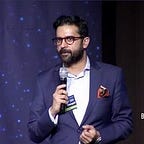Will Decentralization Help Us In Achieving Utopia from centralized governments?
“Lack of transparency results in distrust and a deep sense of insecurity.”
These words of Dalai Lama can brilliantly sum up the insecurities arising within public hearts because of the opaque nature of government structures.
Hazy operations is an idiosyncrasy of governments and economies, causing us to be oblivious to the nature of money flowing through them. Our options are limited to bestow our trust and expect them to use our money for projects and campaigns that benefit us in the long run. However, we won’t know about the corruption within the government or leakages in the flow of money until a scam is exposed or inappropriate allocation of funds is made evident.
The people of Rio de Janeiro recognized this corruption when the Marica bridge was built. It is evident from the picture that the bridge doesn’t serve any purpose because the difference between the distances covered by the bridge and the road is trivial. But, this fact didn’t discourage the government from spending $5million on its construction followed by additional $80k for its opening. It’s funny to note that the local population earns a meager income of $700 per month. The government chose to spend money on something as insignificant as this instead of investing in providing a better lifestyle for the people.
This experience is not limited to the people of Rio de Janeiro; people all over the world are being scammed by the corrupted government. The centralized model of government is not open to an inquiry from the general public on a regular basis. Only final results are exhibited in front of us, the path chosen, and the money invested in never revealed during the processing stage of a project. The corrupted government officials take liberty in this power of maintaining oblivion and exploits it to fill their own pockets.
Government is a mere intermediary that makes monetary, military and political decisions on behalf of the citizens. The delinquency here is that intermediaries are operated by humans, who tend to fall prey to the nature of taking power for granted. When power is misused, most challenging global issues take birth. These are inclusive of decreased access to a financial system for the general public, manipulation of asymmetric information and fueling of wars, besides systematic corruption.
John Adams correctly believes “Because power corrupts, society’s demands for moral authority and character increase as the importance of the position increases.”
The solution to this man-made problem is provided by the man himself by introducing technologies that decentralize systems to instill transparency in operations and traceability of resources invested. Decentralized technologies eliminate the need to position a human intermediary in systems by providing a global platform for respective parties to interact on a peer to peer network.
Blockchain, a decentralized technology, is experiencing widespread implication across industries. It is still to make an appearance in the economic realm but its utilization in government operations can produce major benefits. Let me elucidate on this with the help of an example of a fictional country resided by 20,000 people. The country’s government operates on Blockchain and all the citizens are provided with digital tokens which function as Voter Id card. The government holds public voting sessions on digital platforms where the citizens can vote and help in making some important decisions that’ll affect them all. For example, the government initiates voting to decide if a particular area should have a new school, hospital or a bridge. The funds available to the authorities are limited so, in order to put them into best use, they ask the citizens what they want the most. One token can be used only once to cast a vote and the project with popular votes goes under construction.
The Blockchain also allows the citizens to monitor the allocation of funds by accessing platforms similar to Etherscan. It provides continuous updates of transactions taking place on the platform. This transparent tracking of funds also makes the country’s auditing easy at the end of the year. It is because every transaction is automatically updated on the country’s own Blockchain network. The records maintained are immutable and tamper-proof ensuring their authenticity. The Blockchain network of the government also provides with a contract address that enables the citizen to track the expenditure made with every penny that he paid in taxes. In this situation, the government is still an intermediary, but its power is decreased exponentially and is given to the citizens.
Similar to this instance, a country with a population of more than 2 billion can also shift their government on Blockchain network. The country will be divided into multiple manageable constituencies and they’ll be administered by appointed ministers. The responsibility of resource allocation and voting will be placed on his shoulders instead of the central government.
Amalgamating technology with traditional methodologies can prove to be the utopia that the entire world dreams of.
